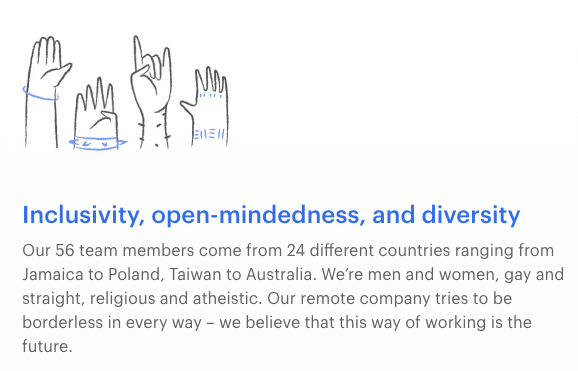How to attract, hire and retain remote employees
Attracting, hiring, and retaining remote employees requires a unique approach. Building a strong online employer brand, advertising in the right places, using synchronous and asynchronous tools for assessment, asking for referrals, and designing attractive compensation packages are key.

When you’re hiring remote employees, you may come across various challenges, like where to publish your remote positions or how to build your employer brand online. In this guide, we provide tips on how to recruit and hire remote employees, plus guidance to manage and retain them.
Hiring remote employees can benefit your organization by bringing in skills that are scarce in your location. In turn, remote work benefits employees by offering the option to pursue the job they really want, without the need to relocate. But, attracting and retaining remote workers brings its own set of challenges. Find out how to redesign your hiring process to recruit and hire remote employees, then how to effectively manage and retain them.
Contents
How to attract remote employees
Build a strong employer brand online
Having a good employer reputation will help you attract and retain qualified people. Local candidates might be easier to reach: they’ve probably heard about your company, know one of your employees or they’ve seen your offices first-hand during the interview process. But, if you’re hiring remotely, candidates have to rely on your digital presence to learn about your company.
Make sure your online presence shows you’re trustworthy, clearly illustrates your culture and helps candidates visualize themselves as members of your team. To achieve this, create informative careers pages and attractive social media accounts that:
Describe your way of working. Remote employees often make their own schedule, but they still want to know what the job entails and what their obligations will be. Explain the level of flexibility you offer and, if possible, give a glimpse into the typical day of most of your employees.
For example, Buffer is a remote-first company and its employees share how they organize their own schedules to achieve work-life balance.
Include employee testimonials. Ask your remote employees to tell their story, what made them choose a remote job and why they stay at your company. These stories will serve as an inspiration for people who are considering an application.
Here’s a YouTube playlist with stories from Automattic employees, who describe their work and what they like about it.
Showcase in-person meetings. If you host annual company all-hands meetings or if your teams occasionally gather and attend conferences, capture and share these moments using photos or videos.
Expensify, that has both in-office and remote workers, organizes a month-long offsite trip every year. Employees get to explore a new country, work together and live a unique experience.
Present the values that define your culture. Every company wants to hire and work with people who share the same values. Be open about what you’re looking for in coworkers and what kind of qualities are most important to your team.
Doist, the remote-first company behind popular apps like Todoist, makes sure to highlight its inclusive approach in hiring through its careers page and job ads. Find out more about Doist’s method and approach to hiring remotely, in our interview.

Select the best places to advertise your remote jobs
Consider advertising your open roles on job boards and social networks dedicated to remote work. Here are some options:
| Job boards | Social networks |
| FlexJobs | Work From (Slack) |
| We work remotely | Nomad List (Slack) |
| Working Nomads | Digital Nomad Jobs (Facebook) |
| RemoteOK | Remote & Travel Jobs (Facebook) |
Large, global job boards, like Indeed and Monster, can also be effective, as long as you clearly state in the job title that you’re hiring remotely. If you want to recruit candidates in a specific city or country, it might be a good idea to advertise your open roles on local job boards.
You can choose between global and local, broad or industry-specific job boards, when advertising your open roles with Workable. You can read the entire list of the job boards we integrate with or contact one of our product specialists directly to learn more.
How to hire remote employees
Use synchronous and asynchronous means to assess candidates
When hiring remote candidates, phone and video interviews will be your primary communication channels. Make sure you use the right tools to make communication easier. Also, it’s a good idea to use assessment tools to evaluate candidates’ skills and make objective hiring decisions, even if you don’t meet candidates in-person.
Here are some suggestions of tools you can use to:
Conduct interviews remotely:
- Spark Hire helps recruiters and managers reach better hiring decisions, as they can view recorded interviews and compare candidates’ answers at any stage of the hiring process.
- Jobma helps you screen candidates faster as you can share your interview questions and ask candidates to answer them via video in their own time.
- HireVue lets candidates self-schedule interviews which can be useful in cases of big time zone differences.
Assess culture fit:
- ThriveMap identifies how people like to work to help you create productive teams.
- Saberr uses data-driven technology to predict how well a candidate will fit into the role, team and organization.
- Human employs AI to remove bias that could unconsciously impact your hiring decisions due to cultural differences.
Ask for referrals
There’s no reason why you shouldn’t reach out to your existing employees for referrals, when hiring remotely. Describe the skills you’re looking for and clarify that there are no location boundaries.
And just like your employees can refer people to you, they can also refer your company to their network and serve as advocates for your employer brand – particularly those who already work remotely. They can share first-hand experience of what it feels like being part of a distributed team and, this way, bring in more applicants.
How to retain remote employees
Design attractive and fair compensation packages
You can’t woo remote employees with ping pong tables and free snacks (and probably not your in-office employees either.) Employees are more likely to care about compensation plans that are:
Attractive: When you’re hiring remote workers, you’re competing against companies from all over the world. This means you should put extra effort in designing equally competitive compensation packages. If you can’t increase salaries, consider offering benefits like mobile plans or stock option plans, if possible.
Fair: Think of two remote employees; one is in Singapore, the most expensive city to live in, and the other’s in Lisbon, the cheapest place to live in. If they’re doing the same job, should you pay them the same or adjust their salaries based on their cost of living? There’s probably a balance. It’s best to build compensation and benefits packages that speak to your employees’ needs but also don’t create huge salary gaps between team members.
Be transparent to let potential candidates know what to expect and reinforce equity among existing employees. Here’s an example from Buffer that created a salary formula to explain how they calculate employees’ salaries and how they increase over time.
Offer meaningful benefits
Consider benefits that matter to all employees. When managing remote employees, ask what kind of perks would be useful to them and, if possible, offer them as welcome gifts (like noise-canceling headsets for employees who’ll work in public spaces.) Here are some examples:
- Professional development. Like most employees, remote workers seek to grow professionally so include them when designing career paths or training programs. You could buy them tickets to conferences, enroll them to online courses and discuss how they can evolve within your company, taking up more challenging projects.
- Vacation plan. It’s common for remote employees to end up working longer hours than office employees, as they don’t need to commute. This means that they’ll appreciate a generous vacation plan or even unlimited vacation days.
- Health and life insurance. Employees who choose remote jobs often claim they want to be closer to their families. Consider offering health and life insurance plans for your employees and their loved ones, as part of their benefits package.
- Memberships to coworking spaces or discount at local stores. Ask your employees what remote work means to them. If, for example, they work at a shared office, buy them a membership. If they prefer to work from a local cafe or library, offer them some gift cards for their daily beverages and snacks.
At the end of the day though, your remote employees are similar to their office-based colleagues in that they want to be respected and have resources to be productive and successful. Build a culture that gives all that to every employee, even if they’re miles or oceans apart.
Useful resources:
Frequently asked questions
- What are the key steps to hiring an excellent remote employee?
- Hiring an exceptional remote employee involves a well-thought-out process. This includes having a value-add application process, utilizing tools like video interviews or projects to assess the candidate's fit within your company culture, and ensuring a thorough evaluation before extending a job offer.
- How can a company attract, hire, and retain remote employees effectively?
- To attract, hire, and retain remote employees, a company must showcase its unique attributes and work culture. This involves demonstrating why the company stands out from its competitors and why it's an excellent place to work. The company's distinctiveness can be a significant factor in a candidate's decision to apply for a job.
- What strategies can be used to advertise remote work effectively?
- Effective advertising for remote work involves educating potential candidates about the job and the company. Posting job vacancies on remote-specific job boards, advocating for a wide-ranging search for talent, and utilizing social media channels can help reach a broad range of applicants.
- How can a company design attractive and fair compensation packages for remote employees?
- Designing attractive and fair compensation packages for remote employees involves considering global competition and local living costs. Offering competitive salaries, considering benefits like mobile plans or stock option plans, and being transparent about how salaries are calculated can help attract and retain remote employees.
- What kind of benefits can a company offer to retain remote employees?
- Retaining remote employees can be facilitated by offering meaningful benefits. These can include professional development opportunities, a generous vacation plan, health and life insurance, memberships to coworking spaces, or discounts at local stores. Understanding what remote work means to each employee can help tailor these benefits to their needs.




